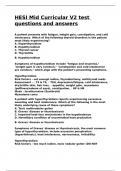HESI Mid Curricular V2 test
questions and answers
A patient presents with fatigue, weight gain, constipation, and cold
intolerance. Which of the following thyroid disorders is the patient
most likely experiencing?
A. Hyperthyroidism
B. Hypothyroidism
C. Thyroid cancer
D. Thyroiditis
B. Hypothyroidism
Symptoms of hypothyroidism include "fatigue and insomnia,"
"weight gain is very common," "constipation and cold intolerance
are common," which align with the patient's presenting symptoms.
Hypothyroidism
Risk factors - not enough iodine, thyroidectomy, antithyroid meds
Assessment - ↓ T3 & T4, ↑ TSH, depression/fatigue, cold intolerance,
dry/brittle skin, hair loss, ↓ appetite, weight gain, myxedema
(puffiness/edema of eyes), constipation, ↓ BP & HR
Meds - levothyroxine (Synthroid)
Myxedema coma
A patient with hyperthyroidism reports experiencing excessive
sweating and heat intolerance. Which of the following is the most
likely underlying cause of these symptoms?
A. Toxic multinodular goiter
B. Graves' disease or thyrotoxicosis
C. Impaired heat-loss mechanisms in the hypothalamus
D. Hereditary condition of uncontrolled heat production
B. Graves' disease or thyrotoxicosis
Symptoms of Graves' disease or thyrotoxicosis, the most common
type of hyperthyroidism, include excessive perspiration
(hyperhidrosis), heat intolerance, nervousness, irritability.
Hyperthyroidism
Risk factors - too much iodine, toxic nodular goiter (DO NOT
,PALPATE), thyroid replacement meds
Assessment - lots of energy, enlarged thyroid gland, weight loss, ↑
appetite, diarrhea, heat intolerance, tachycardia, ↑ BP, diaphoresis,
nervousness, insomnia, T3 & T4 ↑, TSH ↓, exophthalmos (encourage
lubricant eye drops)
Meds - iodine (Lugol's solution), beta-blockers (↓ HR & BP),
antithyroid meds: methimazole, propylthiouracil (PTU)
Treatment - radioactive iodine therapy, thyroidectomy
Thyroid storm S&S - fever, tachycardia, agitation, HTN
0:11
/
0:15
Skip Ad
A patient has been prescribed eye drops following eye surgery.
Which of the following instructions should the nurse provide
regarding proper administration of the eye drops?
A. Tilt the head back and instill the drops directly into the eye B.
Wait 5 to 10 minutes between instillation of different eye drop
medications
C. Use the same bottle of eye drops for both eyes
D. Discard any remaining eye drops after the prescribed course is
completed
B. Wait 5 to 10 minutes between instillation of different eye drop
medications
When more than one drop is prescribed, teach the patient to wait 5
to 10 minutes between drug instillations to prevent one drug from
diluting another drug.
Also do not touch the tip of the dropper to your eye, administer
drops in conjunctival sac (NOT in the lacrimal duct - can cause
systemic absorption), DO NOT RUB EYE
A patient with a pulmonary embolism (PE) presents with cyanosis
and hypotension. Which of the following is the most likely cause of
these symptoms?
A. Decreased tissue perfusion
B. Increased pulmonary blood flow
C. Improved gas exchange
D. Right ventricular hypertrophy
, A. Decreased tissue perfusion
Cardiac symptoms related to decreased tissue perfusion include
cyanosis hypotension. Systemic hypotension results from acute
pulmonary hypertension and reduced forward blood flow.
Implement O2 therapy, monitor O2 sat, severe hypoxemia may
require mechanical ventilation
Administer anticoagulants as ordered to improve tissue perfusion -
monitor for bleeding
Document increasing dyspnea, dysrhythmias, distended neck veins,
edema
Ambulate as tolerated, elevate legs when in bed/chair
Instruct patient on wearing knee/thigh high compression stockings
long-term to prevent venous insufficiency and reduce swelling
Select all medications that may be ordered preoperatively for a
patient undergoing surgery. (Select all that apply)
A. Benzodiazepines
B. Opioids
C. Antiemetics
D. Antihypertensives
E. Anticholinergics
A. Benzodiazepines
B. Opioids
C. Antiemetics
E. Anticholinergics
The anesthesia provider or surgeon may order preanesthetic drugs
("on-call medications," "preops") to reduce patient anxiety, the
amount of general anesthesia required, respiratory tract secretions,
and the risk of nausea, vomiting, and possible aspiration. Typically,
the nurse administers preoperative medications before a patient
leaves for the OR. Preoperative drugs such as benzodiazepines,
opioids, antiemetics, and anticholinergics usually cause dry mouth,
drowsiness, and dizziness but do not induce sleep.
Which of the following medications may cause concern during a
preoperative assessment? (Select all that apply)
A. Oral anticoagulants
B. Over-the-counter medications
C. Herbal supplements




